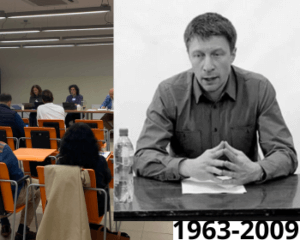 Vladimir Furs (1963-2009) was an outstanding figure: a Belarusian philosopher, Doctor of Philosophy, Professor, Head of the Department of Scientific Research, creator and director of the master’s program “Social Theory and Political Philosophy” at EHU, also — initiator and leader of numerous regional and international research and educational projects. He authored four monographs and over 100 publications in Russian, Belarusian, Ukrainian, English, Lithuanian, and French. Vladimir Furs made a significant contribution to the development of philosophy and social sciences in Belarus and in the region.
Vladimir Furs (1963-2009) was an outstanding figure: a Belarusian philosopher, Doctor of Philosophy, Professor, Head of the Department of Scientific Research, creator and director of the master’s program “Social Theory and Political Philosophy” at EHU, also — initiator and leader of numerous regional and international research and educational projects. He authored four monographs and over 100 publications in Russian, Belarusian, Ukrainian, English, Lithuanian, and French. Vladimir Furs made a significant contribution to the development of philosophy and social sciences in Belarus and in the region.
The year 2024 marked the 15th anniversary of the passing of the eminent scholar, and thus the conference held was dedicated to his memory and his scholarly legacy. The title of conference “Contours of Contemporary Critical Theory” was inspired by the monograph published by Vladimir Furs in 2002, serving as the foundational theme guiding the direction of philosophical reflection and panel discussions.
Over the course of two days 8 panels were conducted where researchers from Lithuania, Belarus, Poland, Ukraine, Germany, Switzerland, and UK presented and discussed their papers addressing a wide range of contemporary issues. The thematic directions of the panels were varied and compelling. Participants’ presentations explored historical trajectories and contemporary conceptualizations of critical theory, forming a “unity in diversity” grounded in the ongoing relevance and adaptation of critical theory amidst evolving technological, social, political, and ideological landscapes. Critical theory was approached as an interdisciplinary paradigm, existing at the intersection of different fields of knowledge and various theoretical and methodological approaches.
The conference covered a broad spectrum of themes and discussions reflective of contemporary critical theory. Thematic frameworks of panel included Marxist critique of capitalism and its evolution in modern society; exploration of political processes and contemporary issues in political practices within the critical social theory; examination of crises in the discourse of globalization and conceptualizations of modernity, focusing on their historicization and application in current global contexts. There was a panel dedicated to feminist and gender critique within critical theory. There was a panel addressed psychoanalytic perspectives that diversified and denaturalized social norms and subjectivities where discussions analyzed how psychoanalytic theories, notably Jacques Lacan’s, challenge conventional notions of desire, identity, and social formation, alongside their role in critiquing dominant social structures and potential in envisioning alternative social configurations. Furthermore, there was a panel dedicated to critical examinations of media, the Internet, and digital technologies explored their impact on contemporary social narratives and political landscapes. And the last panel focused on postcolonial studies, critiquing how colonial history continues to shape socio-political landscapes and influence discourses on identity, power, and resistance across various geopolitical contexts; discussions within this thematic strand also encompassed strategies of decolonization.
Each panel presented a comprehensive exploration of critical theory and its effective potential from diverse disciplinary perspectives, offering theoretical ideas and methodological innovations for understanding and transforming contemporary society and its multifaceted issues, both narrowly and broadly construed, within Belarus and beyond. The conference served as an interdisciplinary platform that brought together contemporary thinkers to discuss pressing issues of modern society through various theoretical and methodological approaches to critical analysis of social reality.
As part of the conference’s concluding remarks, it was also announced the release of Vladimir Furs’s new book in Belarusian, titled “Беларусь у святле сучаснай крытычнай сацыяльнай тэорыі”. This book was specially prepared for the event and involved the participation of his students and colleagues in its creation.
The interest of the conference participants in the issues under discussion, as well as the significance of the figure of V. N. Furs himself and his contribution to the development of Belarusian social-critical philosophy make the idea of holding annual “Furs Readings” relevant: the first conference within the framework of the “Readings”, dedicated to the legacy of Z. Bauman, is already scheduled for June 2025.
We sincerely thank all participants of the conference and look forward to seeing you again at the European Humanities University!